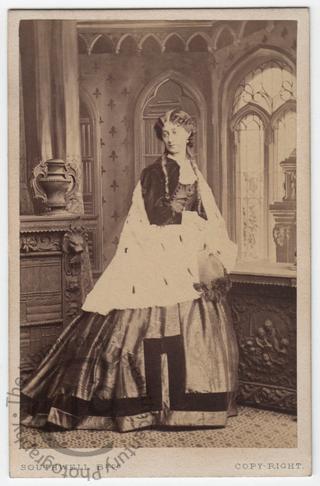
Rose Leclercq
A carte-de-visite portrait of the actress Rose Leclercq (1843-1899).
‘MISS ROSE LECLERCQ — the celebrated and popular actress, died last Sunday evening of pneumonia after a very brief illness. She was performing only a few days before. Miss Leclercq, who was a native of Liverpool, made one of her earliest London appearances September 28th, 1861, at the Princess’s Theatre, in Playing with Fire. On September 21st, 1863, she was seen at Drury Lane in The Dead Boatman, by Mr F.C. Burnand. But the performance that first gave her a reputation as an actress was her beautiful rendering of “The Phantom of Astarte,” in a revival of Byron’s Manfred on October 10th, 1863. Her graceful appearance and intellectual acting made a vivid impression. In August, 1868, Miss Leclarcq played the heroine of Boucicault’s After Dark at the Princess’s Theatre, and in the following year the chief female character in the same author’s Lost at Sea, produced at the Adelphi Theatre. In Boucicault’s Paul Lafarge, brought out at the Princess’s, March 7th, 1870, she sustained the character of the heroine, and at the same theatre in the following November she appeared in The Pretty Girls of Stilberg, in which Mr Webster was so celebrated as Napoleon. A fine performance was that of the Queen to the Ruy Bas of Fechter at the Adelphi in March, 1872, and in the same year she played Desdemona to the Othello of Phelps, and as Mrs Ford in The Merry Wives of Windsor at the same theatre her success was brilliant. On September 4th, 1875, The Shaughraun was produced at Drury Lane, and Miss Leclercq appeared as the heroine; but perhaps the most attractive of all her parts was That Lass of Lowrie’s, in which her commanding presence and the intensity of her acting as the mining heroine caused the drama to be extremely popular. In some of Shakespeare’s comedies Miss Leclercq displayed the highest ability. She played Celia to the Rosalind of Miss Faucit, and distinguished herself in Ophelia and Desdemona, revealing also the tragic intensity necessary for Lady Macbeth. In fact, her versatility was so great, and her command of humour and pathos so complete, that she never failed to do justice to any character in which she appeared. One her latest parts was in The Manoeuvres of Jane at the Haymarket Theatre. Before coming to London the late actress was a great favourite at Glasgow. Her death taking place after so short an illness has caused the deepest regret to her professional associates, who equally admired her splendid talents and amiable character, while in a wide circle of private friends her loss will also be sincerely deplored’ (Illustrated Sporting and Dramatic News, 8 April 1899).
Code: 127886




